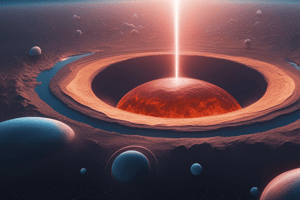Podcast
Questions and Answers
What phenomenon describes the beginning of the universe's expansion?
What phenomenon describes the beginning of the universe's expansion?
- Transformation
- Accretion
- Contraction
- Inflation (correct)
Earth is the only planet in the solar system known to support life.
Earth is the only planet in the solar system known to support life.
True (A)
What are the four subsystems that compose the Earth?
What are the four subsystems that compose the Earth?
Geosphere, Hydrosphere, Atmosphere, Biosphere
The __________ radiation is the heat left over from the Big Bang.
The __________ radiation is the heat left over from the Big Bang.
Match the following terms with their descriptions:
Match the following terms with their descriptions:
What is one of the primary functions of the atmosphere on Earth?
What is one of the primary functions of the atmosphere on Earth?
Water is essential for life but solely exists in gas form on Earth.
Water is essential for life but solely exists in gas form on Earth.
What is the maximum density of water in degrees Celsius?
What is the maximum density of water in degrees Celsius?
The __________ effects of greenhouse gases contribute to warming the planet.
The __________ effects of greenhouse gases contribute to warming the planet.
Match the following Earth subsystems with their descriptions:
Match the following Earth subsystems with their descriptions:
Flashcards are hidden until you start studying
Study Notes
Origin of the Earth
- Earth is unique within the solar system as it is the only planet capable of supporting life.
- The universe began expanding approximately 13.8 billion years ago due to the Big Bang.
Evidence Supporting the Big Bang Theory
- Galaxies are observed receding from our point, indicating the universe’s expansion.
- Light elements such as hydrogen, helium, and lithium are prevalent, supporting earlier predictions of their abundance.
- Cosmic Microwave Background (CMB) radiation represents the residual heat from the Big Bang.
Accretion and Planet Formation
- Accretion is the process where gravity pulls tiny particles together to form larger bodies in space.
- This process leads to the formation of planetesimals, which can coalesce into protoplanets.
- A protoplanet is essentially an embryonic planet made from collected matter.
Requirements for Life on a Planet
- Temperature: Essential for energy flow and chemical reactions favoring life.
- Water: Vital for chemical transport and cellular processes.
- Atmosphere: Protects from harmful radiation and regulates temperature by trapping heat.
- Nutrients: Critical for the development and maintenance of organisms.
Factors that Make Earth Special
- Receives an adequate amount of solar energy.
- Maintains a temperature suitable for life.
- Contains various gases (like CO2, H2O vapor, CH4) vital for life processes.
- Presence of oxygen and liquid water form a foundation for life.
- Magnetic field shields Earth from cosmic radiation.
Earth's Subsystems
- Atmosphere: A protective layer of gases that insulates Earth and regulates temperature. Includes greenhouse gases which play a crucial role in the greenhouse effect.
- Hydrosphere: Encompasses all of the Earth's water, possessing properties like high specific heat capacity and maximum density at 3.98°C.
- Lithosphere: The rigid outer shell of the Earth composed of rocks, soils, and minerals.
- Biosphere: Represents the sum of all ecosystems, where life interacts with the other subsystems.
Studying That Suits You
Use AI to generate personalized quizzes and flashcards to suit your learning preferences.




